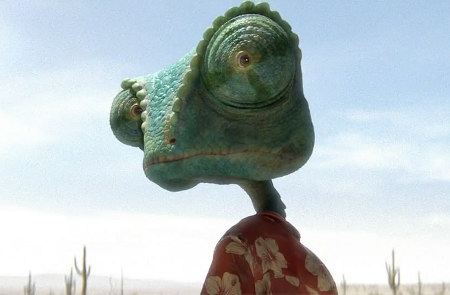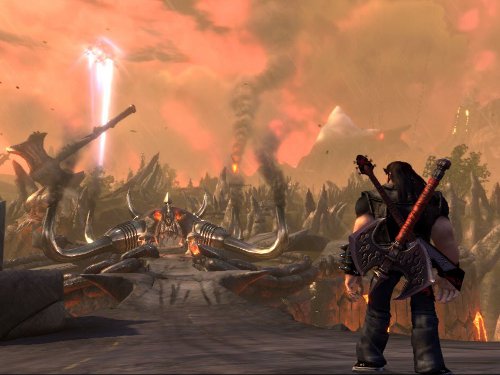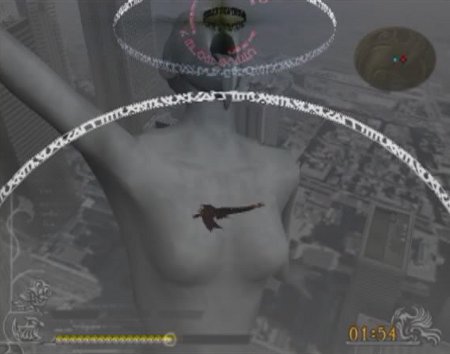The Importance of Focus
2012, May 31st 7:31 AMI've been watching a lot of movies lately. This means that you get to read a bunch of posts connecting movies and game design.
Today, let's talk about Rango.

Rango is a movie about a chameleon. The chameleon's terrarium is lost on the highway and he is left abandoned in the middle of the Mojave Desert. If you were going to list the ideal places for a chameleon to live, the Mojave Desert would be very low on the list.
Terrified and dying of dehydration, our titular chameleon runs into a philosophical armadillo who's been bisected by a truck and is in the mood to dispense advice. The movie gets surreal.
Now, first, recognize that I try to go into movies with no knowledge of the plot. Going into Rango, I think my full knowledge of the movie was "there's a chameleon voiced by Johnny Depp". Every once in a while I end up watching a movie which completely defeats my expectations at every point, for better or worse, usually for the better. (Pixar's great at doing this.)
In the case of Rango, I started thinking, hey, this is pretty weird, this must be a surreal movie! This is going to be great! I love surreal movies!
Then the main character ran into the sidekick and all the surreality went out the window, to be replaced, briefly, with a goofy buddy plotline.
For the remaining 90 minutes of the movie, the tone changed repeatedly. First it turned into a story about trying to fit in. Then it became a story about a band of elite commandos, who largely seem to have been picked by the main character because he needed a band of elite commandos and, well, they were there. The Elite Commando arc finished, in a weirdly comedic scene full of exploding bats, and most of those characters faded quietly into the distance as the movie transformed into a minimal murder mystery. The surrealism came back when the main character meets the Spirit of the West, then quickly gets shuffled off camera yet again, as a villain quickly vacillates between a colossal threat and a friend.
With Rango, I never quite knew where the movie was going to go. But that's cool. I don't need to know where the movie's going to go, and I don't want to know where the movie's going to go. Problematically, though, I had the feeling that the movie didn't know where the movie was going to go. It didn't feel like a unified production. Even though the plot was solid, even though all the Chekhov's Guns were properly placed and recovered by the end, even though all the character arcs intermingled and interacted, the movie as a whole simply didn't feel cohesive. There was no theme.
Now let's talk about video games.

Brutal Legend was an open-world exploration game released two years ago. The demo, and most of the promo materials, showed it off as a third-person brawler. This was accurate for the first third of the game . . . until it morphed unexpectedly into a real-time strategy game.
Devil May Cry was a plot-based third-person brawler/shooter . . . right up until the final boss, which drops you straight into a Starfox-esque 3d shooter.
World of Warcraft is a game about playing a fantasy hero, defeating big bad guys and collecting loot, using a palette of moves based on your character class. Or that's what you used to think! Then they introduced a dungeon named The Oculus, which unexpectedly shifted from controlling your character on a mostly-flat plane to controlling a dragon in full 3d, with a new, limited, and painfully uninteresting set of moves. Worse was the raid equivalent, Malygos, known for causing frustration (and motion-sickness) in a large amount of the playerbase.
And finally, Drakengard, a game which could charitably be considered a gigantic troll from beginning to end, finished up its Ultimate Ending by throwing away all of its normal game mechanics and transforming into a two-button rhythm game, of all things.
Now, I don't want to claim that games should never introduce new game mechanics. Many games make great use of minigames, sometimes giving the player a break between long segments of the primary mechanic, sometimes using the opportunity to tweak the tone of the game. The inevitable lockpicking minigames that always seem to show up in fantasy RPGs is a great example – you want to pick a lock, suddenly you're playing a minimal lockpick simulator. Once that's complete, back to the main game!
The difference is that these games don't include it as a shoehorned-in part of the main plot. The games that include lockpicking simulators are generally intended to be semiaccurate sandbox games, including lockpicking, and the designers want something that feels a little more concrete than a random die-roll. Maybe they're sandbox-simulating a magic-slinging fantasy hero, sure, whatever, but in a game like that, the gameplay is taken from the behavior of the character. One can easily imagine a magicsmithing minigame, or a horseriding minigame, or a shopkeeping minigame, side-by-side with the lockpicking. Conversely, nobody anywhere said "hey, I really like beating up crazy heavy metal archetypes while wielding a magic guitar, but you know what I've always assumed would go along with a heavy metal beatdown? Resource management, unit construction, and research!"
The real key here is that a game, like a movie, must know what it is. A game about kungfu should stick to kungfu. A game about fantasy warfare should stick to fantasy warfare. And a game about destroying thousands of bad guys with long-range artillery backup from a dragon should remain that way.

The problem with Rango, as I see it, is that nobody sat down to determine what the movie was really about. One group wanted a surrealistic mind exploration. One group wanted a goofy action comedy. One group wanted a murder mystery. The movie's backbone was never properly laid out, and so the movie itself ended up being indistinct and illdefined.
Brutal Legend had a similar issue. I think it could have made a great brawler. I think it could have made a great real-time strategy game. But the unhappy medium didn't work – the two parts didn't feel unified and didn't feel appropriate. I wasn't involved in the design meetings, of course, but I have a hard time imagining how people could have sat down and described the intended theme of the game, the intended backbone, and come up with what Brutal Legend ended up being.
The theme needs to be determined. Movies, games, books, it doesn't matter – artwork without firm intention simply does not stand up.

